Enjoying "Twelfth Night" by William Shakespeare
Ed Friedlander, M.D.
scalpel_blade@yahoo.com

No texting or chat messages, please. Ordinary e-mails are welcome.
Unlike my other pages on Shakespeare, there is no "mature" content here.
In keeping with the theme of "pursuit of happiness", this was my July 4, 2003 holiday
project.
|
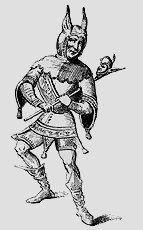 |
Shakespeare's comedy, "Twelfth Night", shares much with our era's "Harry Potter"
and "Forrest Gump".
It is a wildly improbable, hugely entertaining fantasy. And just beneath the
surface are life's darkest, most terrible truths.
In the era of kings, the court jester has one special privilege. It was his
job, when it was necessary, to speak plainly to the king
and to tell him the blunt truth.
In "Twelfth Night", behind all the humor, both the jester and the play
tell a truth that is at once happy and sad. Life is full of sadness.
The best years of life are short.
Events are cruel. And other people are cruel. In such a world, it is your
DUTY to find and cherish whatever real happiness you can.
|

Getting Started
Twelfth Night -- study guide
Twelfth Night -- text from Bartleby
Twelfth Night -- text from MIT
The names of Shakespeare's comedies don't really describe their content.
In Shakespeare's time, the Advent season was penitential,
and the Christmas celebrating only began on December 25th.
"Twelfth Night" is January 5-6,
the twelfth night after Christmas; you know the song about
the twelve days. It marked the end of the festive season with the arrival of the
wise men.
It was a time for partying and gift-giving. You can decide for yourself
whether the themes of the play remind you of the gifts of the magi.
Sometimes the holiday was celebrated by breaking society's conventions,
with masters waiting on servants, and people being allowed to play
whatever roles they wanted ("what you will").
The subtitle is "What You Will", perhaps an invitation to invent your own title
or even a reminder of the theme that happiness can be your own choice.
I can't really believe that the subtitle reflects condescension, as some critics
who don't like comedy have suggested.
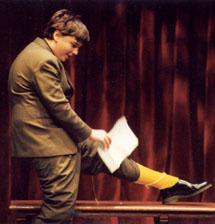 |
If you want to enjoy "Twelfth Night", you will have to accept some obvious impossibilities.
You will have to pretend:
- Fraternal twins of opposite sexes, dressed identically,
are indistinguishable.
And they won't consider the possibility of mistaken identity when things
get puzzling.
- When somebody "falls in love" with a person he or she barely knows,
it predicts a successful long-term relationship.
- Marrying the wrong person because of mistaken identity,
or marrying a not-altogether-nice person like Orsino or Toby Belch,
is likely to lead to lasting happiness.
|
The play is first mentioned in 1601, in a letter written by an Italian
named Don Virginio Orsino, duke of Bracciano. He saw Shakespeare's people perform a play at Whitehall court on
Twelfth Night, January 6. (The Duke's name really doesn't matter in the play,
which wasn't published until the folio of 1623, and perhaps Shakespeare simply
named the duke and the play in memory of the event.) You can read about this in
Leslie Hotson's "The First Night of Twelfth Night".
In 1602, a John Manningham noted that he saw a play called "Twelfth Night"
performed in February 1602, at Middle Temple. "At our feast wee had a play called 'Twelve Night,
or What You Will', much like the Comedy of Errores, or Menechmi in Plautus,
but most like and neere to that in Italian called Inganni."
If you are interested in Shakespeare's plot sources, you can start
with a book by one Barnabe Riche ("Riche His Farewell to Military Profession"),
written in 1581. It contains a story called "Apollonius and Silla"
with a plot similar to "Twelfth Night".
Riche in turn supposedly got his idea from Belleforest's 1571
translation of "Novelle II,36", by Bandello (1554), based in turn
on an Italian farce Gl'ingannati ("The Deceived Ones") from 1531.
Of course, Shakespeare had already used twins and mistaken identity
in his "Comedy of Errors". It's an easy plot to invent on your own,
and Plautus had written something similar in the "Menaechmi". I hope
someday that you'll be able to find these sources online.
Music is important in the play, and you can ask your instructor whether
the songs are original. "O Mistress Mine" is attributed to Thomas Morley,
a musical genius and publisher who died in 1602. In today's movies, it's
common to include a well-known song appropriate to the movie's themes.
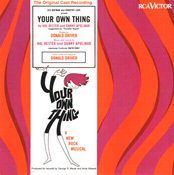 |
In the 1960's, a rock musical called "Your
Own Thing" (compare "What You Will")
was based on the play. It was made easier by the trend for both young
women and young men
to have long hair.
A teen comedy She's the Man,
starring Amanda Bynes, sets the characters and plot in a contemporary
high school. "Wicker Park" included a production of Shakespeare's "Twelfth Night",
and a plot that parallels it.
|  |
The Characters
Viola: The heroine and central character. She and her twin brother
Sebastian were orphaned on their thirteenth birthday.
Her brother describes
Viola as both beautiful ("in spite of the fact that they say she looked like me"),
and being a genuinely nice person. ("She bore a mind
that envy could not but call fair.") She is brave and stays as cheerful
as she can be. In contrast to Olivia, she does not withdraw from the world
to mourn. (Of course, unlike Olivia, Viola can't afford this luxury.)
She loves Orsino unselfishly enough to woo another woman on his behalf.
By the time the first act is over, we realize that Viola, unlike the two
upper-class characters, won't be feeling sorry for herself.
Orsino: Governor of Illyria, variously described as Duke or Count.
He has a fine reputation internationally
(I ii), and is known to be constant and fair (I iii).
While he's in love, though, he's irritable and moody.
Olivia is a wealthy lady who is loved by Orsino.
Her parents recently died, and then the brother who had been
their heir died as well. Olivia seems capable and dignified,
always serious but able to understand and enjoy a joke.
When she falls in love for "Cesario", she is very concerned
about losing her composure, but can't control herself.
Feste: Olivia's jester, a comedian-singer
who used to entertain Olivia's father.
Much of his humor is made-up aphorisms,
parodies of what a wise person supposedly would say, but just as true...
often darkly so. ("Many a good hanging prevents a bad marriage.")
Behind the humor, Feste offers people good advice. (People may accept
what they don't want to hear coming from a joker.)
Notice how he stays detached, and uses opposites and paradoxes, and how
most of his humor is at the expense of the hearers.
(King Lear's jester will do the same, and even sing the same song.)
But Feste is only unkind when he is taking revenge on Malvolio.
Feste's part is written
for a man but has been played just as well
by women. Whoever plays Feste does need to be able to sing.
(If this isn't possible, Fabian or Maria
might do the song at Orsino's.)
Of course, Feste's name means "celebration".
Toby Belch: Olivia's alcoholic uncle whose only interest
is in partying and having fun at the expense of others.
He talks in high language, variously parodying lawyer-talk and knight-talk.
Malvolio: Olivia's administrator.
He is the only character who seems to be making a conscious
effort to be "virtuous", and the only one who shows no warmth towards
others. So people are going to dislike him and try to get back at him.
Outwardly, he's the effective, devoted employee. As steward, it is his job
to manage Olivia's household and affairs. Malvolio wants to run an orderly
house and take good care of Olivia, out of common
affection or a sense of duty or both. Even though he is pompous,
he must be good at what he does.
He must be frustrated
when he cannot protect Olivia (as he sees it) from
the alcoholics
and the rude jester.
Inwardly,
Malvolio has an elaborate fantasy life in which he is independently
wealthy and commands
the obedience of the people who just ridicule him in real life.
But his aspirations toward spirituality are probably real;
he "thinks nobly of the soul". And by the end of the play,
even audience-members who don't sympathize with him early-on will
feel disturbed by the horrible way he gets treated by the pranksters.
"Malvolio"'s name means "evil-wisher". (In pre-Shakespearean
morality plays, characters would be named for the virtues or vices
they acted out.)
Andrew is a "friend" of Toby's, who is scamming him for his money
as a "suitor" to Olivia. Andrew's conversation reveals him to be vain,
cowardly, and stupid. His last name ("Aguecheek")
refers to looking weak from malaria.
Maria: Olivia's feisty housekeeper. She is good at standing up for herself and for her employer.
She says what she thinks, misses nothing, and can hold her own against anybody.
Fabian: A minor character in Olivia's household whose relationship to Olivia is never explained.
Malvolio got Fabian into trouble over a bear-baiting at Olivia's house.
(Bear-baiting is an
old bloodsport in which a tied
bear was teased and then torn apart by dogs.)
Fabian provides an extra to take part in the merriment and
handle the business of getting Viola together with Andrew.
The part can be played by either a man or a woman of any age.
Sebastian is a man of action and strong feeling, loving his sister,
ready to fight, self-effacing,
and solicitous for Antonio's welfare. He is clear-headed
even when nothing seems to make sense, and he welcomes the happiness
that Olivia offers.
Actually, everything we see about both of the twins is likable.
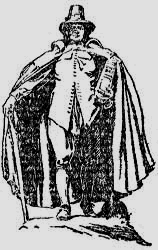
Puritanism
Puritanism
Puritanism in New England
Puritanism Online
Puritanism and The Theatre
Puritanism. The haunting fear that someone, somewhere, may be happy.
One major character in "Twelfth Night" gets called
a "Puritan". This ties in with the play's major theme -- the search for
happiness.
In Shakespeare's time, England's Puritans were members of the English national
church who emphasized the authority of the Bible. They
hoped to abolish ("purify")
the Catholic episcopal hierarchy
which focused on church tradition, liturgy, and the sacraments.
Puritans were Bible readers and tried to apply the guidelines of scripture
to their private and public lives.
For whatever reason, such groups of people often decide
that they must refrain from
many of the pleasures that their neighbors consider harmless.
Burning colorful church furnishings and smashing stained-glass windows
were political expressions. In private a life, a Puritan would
probably wear drab clothing, stay cold-sober,
make holidays
solemn instead of festive, and refuse to do anything
fun on Sunday.
Notably, Puritans preached against people going to the theater.
Obviously, many people
disliked the Puritans for their "holier-than-thou" mentality and their
agenda to force their "conservative lifestyle" on everyone.
 |
Puritanism was popular in the Netherlands, where there was religious
tolerance for radical Protestants. The Dutch hatred of Catholic
Spain may have helped. Most of Shakespeare's Puritan neighbors
probably did not wear steeple
hats with the buckles. But you can see the steeple-hats in Rembrandt paintings
of well-to-do folks in Holland.
In productions, Malvolio often wears the anachronistic buckle-hat. |
There were different kinds of Puritans, just as there are many kinds of
Evangelical Protestants today.
Unlike the Separatists (who founded the Plymouth colony in 1620, the U.S.'s "Pilgrim
Fathers"), most self-styled
Puritans wanted their approach to be the mandatory national religion of England,
"purified" of pre-reformation Catholic features.
And like their counterparts today, they were political activists,
trying to get laws passed to requiring everybody to conform to their
"Biblical" standards.
When the Puritans actually did take over the government, they kept England's theaters
closed for two decades.
You can imagine how Shakespeare's audience felt about Puritans.
Ben Jonson, in "The Alchemist" and "Bartholomew Fair", has hilarious fun
at the expense of Puritan characters named "Tribulation Wholesome"
and "Zeal of the Land Busy". (The scene in which the Puritan objects to a puppet-show,
claiming it is heathen idolatry, reminds me of contemporary pseudo-Islamic extremism.
The mentality must be the same.)
Shakespeare's Falstaff, despite his lifestyle, mouths Puritan-style pieties.
"Julius Caesar" begins with a famous joke. A lone actor comes onto the stage
and shouts "Hence! [Go] Home! You idle creatures!"
For a moment, the audience must have thought that a Puritan
had grabbed the stage and was haranguing them
for being at the theater.
 |
A liberty to that only which is good, just, and honest.-- John Winthrop, first governor of Massachusetts
Dost thou think, because thou art virtuous, there shall be no more cakes and ale?
| 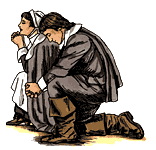 |
Scene by Scene
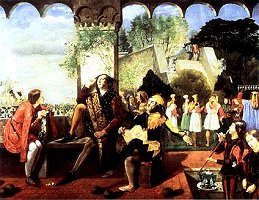 Act I scene I begins with Orsino listening to music, feeling
sorry for himself, and fidgeting.
(It is nice to begin a play with some music before the talking starts.)
Orsino has just sent somebody to ask Olivia to date him. He already
expects she will say no. The language of this scene is difficult
but is worth examining closely. Orsino is
feeling sorry for himself.
If a director wants to focus on Orsino's irascibility and irrationality,
the words "That strain again!" can be a command to the players
to interrupt their piece and repeat his favorite riff.
Then he makes the
musicians stop abruptly, since his mood has shifted once again.
(Shakespeare has to get the music to stop, since there will be a scene change.)
Orsino explains that love is all-consuming like the all-devouring ocean.
When you are in love, everything ordinary seems cheap.
"Fancy", of course, is romantic love,
and it fills the mind with pictures of everything, making the ordinary
seem worthless. One of his friends invites him
to go hunting. (A man confronted with a mopey male friend usually
proposes some recreational activity.) The duke makes a stale pun on hart (deer)
and heart (romantic love), and describes his love strangely: Seeing Olivia
make the world seem not to be rotten ("purged the air of pestilence").
But as a result, he felt no longer in control, the hunted rather
than the hunter. Orsino's friend comes back with the bad news.
Olivia will not consider dating
anybody
until she has completed seven years of
mourning for her brother who recently died just after they both were orphaned.
She will even stay veiled, so that no one can see her face
throughout the seven years. Now, if I were told this about a lady
I'd just asked out, I'd assume I was being told a preposterous story
because she just wanted nothing to do with me.
But the Duke's response is even stranger. Perhaps he has heard this explanation before.
The duke seems to say that Olivia is so full of love just for a brother,
how much more she will love a proper husband who will be everything to her.
So he doesn't lose hope.
Orsino decides he'll
go relax in the flower-bed; he's now enjoying thinking about love
and the flowers will help. (Shakespeare needs to get the actors off-stage for the next scene.)
Notice that the Duke is saying more about being in love than about the lady he actually loves.
Some people have said "he's in love with the idea of being in love." Of course,
Shakespeare's audience is more interested in hearing about love in general, too.
What do you think?
Act I scene I begins with Orsino listening to music, feeling
sorry for himself, and fidgeting.
(It is nice to begin a play with some music before the talking starts.)
Orsino has just sent somebody to ask Olivia to date him. He already
expects she will say no. The language of this scene is difficult
but is worth examining closely. Orsino is
feeling sorry for himself.
If a director wants to focus on Orsino's irascibility and irrationality,
the words "That strain again!" can be a command to the players
to interrupt their piece and repeat his favorite riff.
Then he makes the
musicians stop abruptly, since his mood has shifted once again.
(Shakespeare has to get the music to stop, since there will be a scene change.)
Orsino explains that love is all-consuming like the all-devouring ocean.
When you are in love, everything ordinary seems cheap.
"Fancy", of course, is romantic love,
and it fills the mind with pictures of everything, making the ordinary
seem worthless. One of his friends invites him
to go hunting. (A man confronted with a mopey male friend usually
proposes some recreational activity.) The duke makes a stale pun on hart (deer)
and heart (romantic love), and describes his love strangely: Seeing Olivia
make the world seem not to be rotten ("purged the air of pestilence").
But as a result, he felt no longer in control, the hunted rather
than the hunter. Orsino's friend comes back with the bad news.
Olivia will not consider dating
anybody
until she has completed seven years of
mourning for her brother who recently died just after they both were orphaned.
She will even stay veiled, so that no one can see her face
throughout the seven years. Now, if I were told this about a lady
I'd just asked out, I'd assume I was being told a preposterous story
because she just wanted nothing to do with me.
But the Duke's response is even stranger. Perhaps he has heard this explanation before.
The duke seems to say that Olivia is so full of love just for a brother,
how much more she will love a proper husband who will be everything to her.
So he doesn't lose hope.
Orsino decides he'll
go relax in the flower-bed; he's now enjoying thinking about love
and the flowers will help. (Shakespeare needs to get the actors off-stage for the next scene.)
Notice that the Duke is saying more about being in love than about the lady he actually loves.
Some people have said "he's in love with the idea of being in love." Of course,
Shakespeare's audience is more interested in hearing about love in general, too.
What do you think?
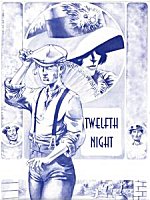
Act I scene ii sets the scene, a shipwreck, and introduces Viola who escaped
with a few other people in a lifeboat but
believes her brother was probably killed. The captain comforts her,
saying he saw her brother tie himself to a mast. The captain explains that
Orsino is duke here in Illyria, and still a bachelor, but is in love
with Olivia. Olivia actually is refusing to date
until a long mourning is over. Viola, also having lost a brother,
says she wishes she served Olivia, but the captain explains she is not
even receiving visitors. Viola tells the captain that she knows you can't judge
by looks but that he looks like an honest
man. (She has little choice anyway, and needs a protector; speaking
like this may actually make the captain not take advantage of her.)
She asks him to help her disguise herself as a boy; evidently she just
happens to have saved a set of clothes just like her brother was wearing.
(Yes, you'll need to suspend your disbelief.) She will see
whether she can get work at Orsino's court, perhaps as a singer.
Since she is
beardless, she will say she is a eunuch.
(Eunuchs were fairly common in Shakespeare's era, and families could choose
this option for sons who might want careers at court.
For obvious reasons, rich men preferred eunuchs to intact men as servants unless heavy
work was required, and eunuch singers were a musical elite.
Of course, this doesn't make castrating boys right,
and we are more enlightened.)
The captain says he will accompany Viola, but we don't see him again,
and hear about at the end that he's safe, having somehow been arrested by Malvolio.
You already know that boys played the female roles in Shakespeare's plays.
We have an actual boy pretending to be a girl pretending to be a boy. In "As You Like It",
it goes one step farther
when Rosalind, a boy actor playing a girl character who is
disguised as a boy, agrees to role-play a girl for Orlando to practice
courting.
Act I scene iii is set at Olivia's house. Sir Toby is Olivia's uncle
and is staying here, apparently at Olivia's expense following the death
of her brother.
It begins with Maria scolding Sir Toby, apparently on Olivia's behalf,
for keeping late hours and being rowdy. We find out that Sir Toby
brought a friend, Andrew Aguecheek, to court her without her permission,
and that he is still here.
Toby explains that Andrew is a knight with a large income, but Maria
says he's stupid and wastes his money. We hear that Andrew
is a bully, a coward, and a heavy drinker. All that Toby
can say in his support is that he plays an instrument and knows a few languages.
Andrew enters and has a short exchange with Maria, who doesn't like
him. Andrew thinks he is clever but is horribly stupid. The two men talk, and Andrew
says he wants to go home because Olivia doesn't like him. Toby appeals
to his vanity and gets him to agree to stay for a month just to party.
Of course, Toby simply wants access to Andrew's
money. The scene ends with their trying a new dance fad, thus getting
them off the stage.
Check your own edition of the play
to understand the wordplay.
Act I scene iv. At Orsino's palace, where Viola is now a pageboy and calling herself Cesario.
One of the Duke's friends remarks that although she's only been there three days,
the Duke has been spending time with "him". The friend confirms
that the Duke isn't capricious and that the boy is likely to become an important person
at court. The duke comes looking for "Cesario", dismisses his other attendants,
and we learn that "he" is the Duke's confidant. Now it's time for Cesario
to camp on Olivia's doorstep, being as rude as necessary to get in.
The duke says "Cesario" is the right person to send because "he" is young
and thus not so serious-looking as another ducal emissary.
When Viola disagrees, the duke says that "Cesario" has the androgynous
beauty of a young teenaged boy and this will appeal to, or be less threatening to,
Olivia. Orsino says he wants to be left alone
("I am best when least in company." At times like this, a man's privacy
needs kick in.)
The scene ends with a surprise. Viola tells us that she herself
is in love with the Duke.
Act I scene v. Feste, the jester, has just come back from
being absent without leave. He refuses to say where he's been,
but he does have a gig at Orsino's and we must think he's job-hunting.
Maria scolds him and warns him that Olivia
may fire him. Both the jester and the housekeeper are witty people,
and though they joke at each others' expense,
it's the sort of kidding seen among good friends.
Again, your edition of the play will help you understand
the verbal gags. "Cucullus non facit monachum" means "The cowl does not
make the monk"; the jester translates, "I wear not motley in my brain."
Acting foolish is my job, it's not me.
Especially, his saying "if Sir Toby would [quit] drinking"
describes something that will never happen. (We say today, "When pigs fly.")
Exiting, Maria urges the jester to be wise when he talks with Olivia.
Alone on stage, the jester states another theme of the play. People who think
they are wise are often foolish, and people who know that they are foolish
(i.e., who know their limitations) are often the wisest. (This is an easy school paper.)
Olivia enters with Malvolio. The jester greets her.
Olivia says she is going
to fire him because he's run out of jokes and is dishonest.
Olivia asks Malvolio
to remove him. The jester makes several jokes, and finally
says that Olivia is foolish
to mourn a brother who is surely in heaven. It's both the kind thing to
say, and his job-saver.
Olivia says the jester is getting better, and she decides to keep him.
Malvolio makes his own joke -- the jester is merely getting sicker ("infirm"
or progressively demented; Shakespeare's age was very familiar with neurosyphilis).
Since being sick in this way erodes wisdom, it "improves folly". The jester
makes a counter-joke about Sir Toby calling Malvolio a fool.
Olivia asks Malvolio whether he can top that. Malvolio can't, and turns mean.
Now, in Shakespeare's era, a jester might be an actual comedian, or a retarded
or deformed person simply kept around as an object of amusement. (Yes, this was
wrong, but it did enable such people to survive in a cruel era.) Malvolio
remembers seeing Feste get upset because he was unable to joke with a retarded man
("an ordinary fool that has no more brain than a stone"). Feste's expression
betrays his own discomfort. Malvolio points this out, and says
that he wishes Olivia wouldn't empower the jester by laughing at
him. But Olivia understands people, and knows what's going on.
"You are sick of self-love,
Malvolio, and taste with with a distempered appetite." To a good person
("generous, guiltless, and of free disposition"), being the object
of a comedian's joke is simply fun -- just as a good person might also
privately accept criticism from another good person. In Shakespeare's era,
the jester was a person of special privilege.
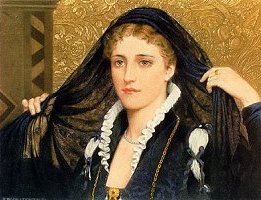 Maria comes in, and announces "Cesario" is at the gate with a petition from
Orsino. Olivia tells Maria to have Orsino's agent leave.
Toby Belch comes in, very drunk, and announces the visitor. Finally,
Malvolio re-enters and says that "Cesario" will not leave. As usual,
Shakespeare is telescoping time. When Olivia finds out that "Cesario"
is a youngster, not quite a man, she invites him in. (Orsino was right.)
Olivia veils herself. Viola enters, and asks for Olivia.
The "boy" seems to begin a prepared,
artificial courtship-speech, then switches to ordinary talk about
how awkward "he" feels. Viola excuses the rudeness she showed to Malvolio
as resulting from the way he treated her. Olivia seems to understand,
and dismisses the others. Alone with Olivia, Viola seems to forget her prepared
speech and simply
asks to see Olivia's face. (Often, saying almost nothing and focusing on the
other person gets the best results.) This works. Olivia parts her veil,
but pretends nothing's unusual and there's nothing about her face that
deserves flattery, as would be offered by a conventional wooer. "Were you
sent here to praise me?" Maybe. But Viola
goes right to the point, focusing not on what's beautiful about Olivia,
but what's ugly. What we call "ego-tripping" used to be called "pride".
It was the devil's sin, and Olivia's vain
refusal to love anybody is denying
happiness both to her suitor and to herself.
Olivia doesn't know what to say, and in a touching passage,
Viola describes how she would woo Olivia were she Orsino.
Viola's genuineness works. (Life's taught me that women want to be courted,
but only with obvious sincerity.)
Olivia suggests that Viola comes back, and offers a tip which Viola refuses.
But Viola leaves angry. Alone, Olivia tells us how impressed she is with "Cesario",
and that she feels she may be falling in love with him. Uh oh! She calls
for Malvolio and tells him to "return" a ring to the boy, pretending
it was from the count and that she's annoyed. This is actually a ploy to get the "boy" to come back.
(Since Malvolio is the steward and might know what
rings Olivia keeps in her pockets, do you think
he sees through the business? Does it matter?)
Maria comes in, and announces "Cesario" is at the gate with a petition from
Orsino. Olivia tells Maria to have Orsino's agent leave.
Toby Belch comes in, very drunk, and announces the visitor. Finally,
Malvolio re-enters and says that "Cesario" will not leave. As usual,
Shakespeare is telescoping time. When Olivia finds out that "Cesario"
is a youngster, not quite a man, she invites him in. (Orsino was right.)
Olivia veils herself. Viola enters, and asks for Olivia.
The "boy" seems to begin a prepared,
artificial courtship-speech, then switches to ordinary talk about
how awkward "he" feels. Viola excuses the rudeness she showed to Malvolio
as resulting from the way he treated her. Olivia seems to understand,
and dismisses the others. Alone with Olivia, Viola seems to forget her prepared
speech and simply
asks to see Olivia's face. (Often, saying almost nothing and focusing on the
other person gets the best results.) This works. Olivia parts her veil,
but pretends nothing's unusual and there's nothing about her face that
deserves flattery, as would be offered by a conventional wooer. "Were you
sent here to praise me?" Maybe. But Viola
goes right to the point, focusing not on what's beautiful about Olivia,
but what's ugly. What we call "ego-tripping" used to be called "pride".
It was the devil's sin, and Olivia's vain
refusal to love anybody is denying
happiness both to her suitor and to herself.
Olivia doesn't know what to say, and in a touching passage,
Viola describes how she would woo Olivia were she Orsino.
Viola's genuineness works. (Life's taught me that women want to be courted,
but only with obvious sincerity.)
Olivia suggests that Viola comes back, and offers a tip which Viola refuses.
But Viola leaves angry. Alone, Olivia tells us how impressed she is with "Cesario",
and that she feels she may be falling in love with him. Uh oh! She calls
for Malvolio and tells him to "return" a ring to the boy, pretending
it was from the count and that she's annoyed. This is actually a ploy to get the "boy" to come back.
(Since Malvolio is the steward and might know what
rings Olivia keeps in her pockets, do you think
he sees through the business? Does it matter?)
Act II scene i. We meet
Viola's brother Sebastian, alive
after all, and dressed like Viola. This is a laugh in itself.
We know they will eventually be mistaken for one another,
and this is part of the fun.
Sebastian is still crying over his
sister, who he thinks is drowned. We learn that his companion, Antonio,
rescued him. Antonio is a gracious man, apologizes for not being
more polite to the man he rescued. Sebastian decides to go to
Orsino's court. Although Antonio says he has enemies at Orsino's court,
he likes Sebastian and decides to accompany him. It'll be fun, he says.
Again, we have the theme of not turning down a chance to be happy, despite
the uncertainties of life.
Act II scene ii. Malvolio catches up with "Cesario", throws the ring
"back" at "him", and tells "him" to stay away. Malvolio is
much ruder than he needs to be. Viola won't pick the ring up off
the ground, and Malvolio storms off. Viola understands immediately.
She remembers how Olivia looked at her. She notes that women's
feelings are swayed uncontrollably by how a potential mate looks.
("Uh, this happens to us men too." -- Ed.) Viola reflect on the situation,
with her usual spunk and hope that things will work out in time.
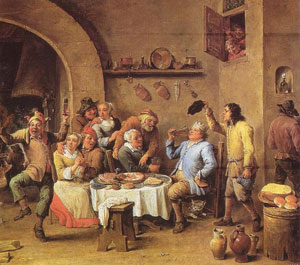 Act II scene iii begins with Toby and Andrew, drunk, very late at night.
Toby tells Andrew that going to
bed after midnight is going to be early. When the jester comes in,
he sees they are drunk, and instead of saying anything clever,
he simply talks nonsense, which they find amusing. They ask for a song,
and the jester sings a touching carpe diem song about
welcoming love when you can, given the briefness of youth and
the uncertainty of the future. On the stage, the contrast between
the drunken stupidity and the touching love song makes us listen to the
message, which states the theme. Toby breaks the mood by saying the jester
has bad breath, and they begin singing a drunkards' round. ("Hold thy peace,
thou knave", known from the Lant manuscript of the era,
must be for when one drinker has said something
deemed inappropriate; we have a song like this at the fraternity house.
Has the jester said the wrong thing by reminding them of the sadness of life?)
They sing so loudly that the housekeeper comes to warn them that
they've probably awakened Olivia and she will send Malvolio to quiet them.
Toby is completely inconsiderate and keeps making noise. Malvolio
comes in and upbraids Sir Toby for his disrespectful behavior. Malvolio
is undiplomatic, but he is in the right.
Notice that unlike Ben Jonson,
Shakespeare does not have his Puritan simply upbraid people for
drinking -- Toby's behavior is actually keeping the rest of the
household awake. Malvolio says Olivia will throw Toby out of the house
if he cannot reform. Toby simply sings another drinking song which the others know
and join. Then, because Malvolio is right about the family problem, Toby changes
the subject. He calls Malvolio a liar for no reason, says he's nothing but
a steward, and is trying to force his own morals on others. ("Dost thou think,
because thou art virtuous, there shall be no more cakes and ale?")
Toby refuses to keep the noise down,
and Malvolio storms off saying he'll tell
Olivia that Maria is partying too. Maria tries to quiet Toby, and explains
what's happening -- "Cesario" came by today and Olivia is obviously troubled.
But Maria already has a plan to get back at Malvolio for his rudeness. She explains
that "sometimes he is a kind of Puritan" -- not a real Bible-reader trying
to live a good-life, but an opportunist who acts out being virtuous and
has a colossal ego. She will write a letter which seems to be by Olivia
suggesting that she is in love with Malvolio, and leave it where he will
find it. The others agree, and after she leaves, the drinkers praise Maria.
Toby says Maria adores him. Andrew remembers sadly, "I was adored once too."
Toby hits up Andrew for more money. Andrew expresses his doubts.
Toby promises that if he keeps spending
money, he'll eventually get to date Olivia. (Iago will pull the same scam on Roderigo in another play.)
The drinkers decide it's
"too late to go to bed now."
Act II scene iii begins with Toby and Andrew, drunk, very late at night.
Toby tells Andrew that going to
bed after midnight is going to be early. When the jester comes in,
he sees they are drunk, and instead of saying anything clever,
he simply talks nonsense, which they find amusing. They ask for a song,
and the jester sings a touching carpe diem song about
welcoming love when you can, given the briefness of youth and
the uncertainty of the future. On the stage, the contrast between
the drunken stupidity and the touching love song makes us listen to the
message, which states the theme. Toby breaks the mood by saying the jester
has bad breath, and they begin singing a drunkards' round. ("Hold thy peace,
thou knave", known from the Lant manuscript of the era,
must be for when one drinker has said something
deemed inappropriate; we have a song like this at the fraternity house.
Has the jester said the wrong thing by reminding them of the sadness of life?)
They sing so loudly that the housekeeper comes to warn them that
they've probably awakened Olivia and she will send Malvolio to quiet them.
Toby is completely inconsiderate and keeps making noise. Malvolio
comes in and upbraids Sir Toby for his disrespectful behavior. Malvolio
is undiplomatic, but he is in the right.
Notice that unlike Ben Jonson,
Shakespeare does not have his Puritan simply upbraid people for
drinking -- Toby's behavior is actually keeping the rest of the
household awake. Malvolio says Olivia will throw Toby out of the house
if he cannot reform. Toby simply sings another drinking song which the others know
and join. Then, because Malvolio is right about the family problem, Toby changes
the subject. He calls Malvolio a liar for no reason, says he's nothing but
a steward, and is trying to force his own morals on others. ("Dost thou think,
because thou art virtuous, there shall be no more cakes and ale?")
Toby refuses to keep the noise down,
and Malvolio storms off saying he'll tell
Olivia that Maria is partying too. Maria tries to quiet Toby, and explains
what's happening -- "Cesario" came by today and Olivia is obviously troubled.
But Maria already has a plan to get back at Malvolio for his rudeness. She explains
that "sometimes he is a kind of Puritan" -- not a real Bible-reader trying
to live a good-life, but an opportunist who acts out being virtuous and
has a colossal ego. She will write a letter which seems to be by Olivia
suggesting that she is in love with Malvolio, and leave it where he will
find it. The others agree, and after she leaves, the drinkers praise Maria.
Toby says Maria adores him. Andrew remembers sadly, "I was adored once too."
Toby hits up Andrew for more money. Andrew expresses his doubts.
Toby promises that if he keeps spending
money, he'll eventually get to date Olivia. (Iago will pull the same scam on Roderigo in another play.)
The drinkers decide it's
"too late to go to bed now."
Act II scene IV begins at the Duke's palace, with the Duke asking for music.
Cesario is sitting with him and the Duke is talking about being lovesick;
again, he's asked for a favorite tune to help his emotions.
While they're waiting for the
singer (the Duke's friends invited the jester), musicians play the tune.
Orsino talks to Viola about being in love,
and by her answers realizes she must have loved too.
The talk goes to how men's affections (no matter what men say)
are less constant than woman's,
and how a woman's beauty fades so quickly.
The jester comes in, and Orsino explains that this is a popular work
song favored by unmarried women. That can't really be the case, since
the song's about a man disappointed in love, but perhaps the melancholy
tune has other words. It turns out that the song is about
a man's suicide after a failed relationship. (No, nobody really dies of
just a broken heart.) The lover in the song asks that there be no funeral
and that his grave
be secret so that other disappointed lovers won't be all the more saddened.
The duke offers a tip to the jester, and after a little word-play, the jester
says that you'll always pay for your pleasures. The jester says (either to
the duke, or to the audience, you decide) that Orsino's mind is beautiful
and turbulent, like the inside of an opal. Orsino asks Viola to go to Olivia once again,
this time with a jewel. (If she accepts, she should agree to date him.)
Viola asks the obvious question -- what if Olivia can't love the Duke?
The duke say he won't accept this answer. Viola asks the next obvious question --
suppose some woman loved Orsino but he couldn't return it?
Since this is unanswerable, Orsino says no woman could say "no"
to the strong emotion he harbors, and not to compare his passion with
a mere woman's. (Yes, Orsino is such a pig.) "But...." says Viola. She tells
the story of her father's daughter who became severely
depressed because, for whatever reason, she was in love with somebody
and couldn't tell, even the beloved. You'll have to decide for yourself
about "green and yellow melancholy". The "green-sickness" was a teenaged girl's
being in love; iron deficiency (which happened after a few menstrual periods)
imparts a green color to the complexion, while somebody who is yellow is probably jaundiced
and liver disease often makes a person depressed. Viola says that a man
may say more, but a woman's love is just as genuine and probably more constant.
Orsino asks whether her "sister"
died (i.e., suicided). Viola says she doesn't know. Of course, Viola's
really talking about herself. She breaks off and goes to Olivia's.
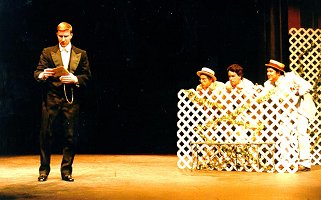 |
Act II scene v.
Back at Olivia's, Maria carries out her plot. She drops the forged
letter on the ground, and helps Toby, Andrew, and a new rowdy named Fabian
hide to watch the fun.
What follows is, when well-played, one of the funniest things you'll ever see.
And it's special, because Shakespeare takes us into the private, secret thoughts
of somebody who hasn't seemed sympathetic.
(He will do this again when the villain in Hamlet
tries to pray.) Shakespeare shows us life, and in his mature works,
the characters are always multi-dimensional and
our sympathies are always at least somewhat divided.
The director must decide whether to play Malvolio mostly for humor,
or to show us his sad inner life. Either works. |
 Malvolio comes in. We hear his thoughts, as they come, in broken sequence.
We hear him thinking about his romantic opportunities.
(When he says, "Maria once told me that she did affect me", it's not clear
to me whether Malvolio thinks he is liked by Olivia or by Maria.
Of course, Maria despises him.)
He thinks his chances for romance
might be good. But then he thinks about how good his luck
might turn. Perhaps he could be a count himself. All that need happen
is that he marry Olivia. Whoever the lady of the Strachy is,
it's a historical fact that the founder of the Tudor line was
a queen's wardrobe valet. Malvolio is most concerned with being obeyed,
then with being wealthy, then to being able to sleep during the day,
and that with Olivia.
Especially, Toby looks forward to
confronting Toby's alcoholism as head of the family, and getting
rid of Andrew. No, Malvolio isn't in love with Olivia. But he's a careerist
who wants to run a good, orderly house.
Malvolio comes in. We hear his thoughts, as they come, in broken sequence.
We hear him thinking about his romantic opportunities.
(When he says, "Maria once told me that she did affect me", it's not clear
to me whether Malvolio thinks he is liked by Olivia or by Maria.
Of course, Maria despises him.)
He thinks his chances for romance
might be good. But then he thinks about how good his luck
might turn. Perhaps he could be a count himself. All that need happen
is that he marry Olivia. Whoever the lady of the Strachy is,
it's a historical fact that the founder of the Tudor line was
a queen's wardrobe valet. Malvolio is most concerned with being obeyed,
then with being wealthy, then to being able to sleep during the day,
and that with Olivia.
Especially, Toby looks forward to
confronting Toby's alcoholism as head of the family, and getting
rid of Andrew. No, Malvolio isn't in love with Olivia. But he's a careerist
who wants to run a good, orderly house.
Malvolio finds the letter. Of course, he is nosy, and
sees that the handwriting on the address ("To the Unknown Beloved")
is Olivia's. He breaks Olivia's wax seal. The letter turns out to be
a riddle which, as Malvolio reads, seems to be her declaration of love
for her steward. The letter declares "Be not afraid of greatness. Some are
born great, some achieve greatness, and some have greatness thrust upon them."
It instructs the beloved to respond by being rude to the servants and Toby
and his circle, to wear yellow stockings cross-gartered, and to smile
at his beloved. Malvolio falls for the letter and goes off joyfully,
and the pranksters congratulate themselves.
Act III, scene i is set in Olivia's garden. Viola meets
the jester, who is playing a drum. She introduces herself
and swap jokes. We are reminded that they're both very clever
people. Viola tips the jester, who goes to get Olivia.
Viola reflects on how much insight into people a jester must have,
what a difficult job it is. She describes
the paradox of how such a "fool"'s quiet wisdom and effort
exceeds that of
many people in the learned professions ("as full of labour as a wise
man's art").
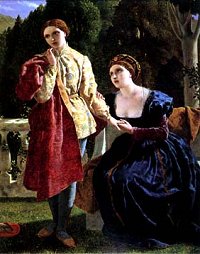 Andrew and Toby, who must have been watching the garden,
come in and speak to Viola. Andrew (whose claim to distinction is knowing
a few foreign languages) tests Viola to see whether she can
speak French, which she can. The two no-goods invite her in to see Olivia,
but Olivia and Maria walk onstage. (Feste had gotten them.)
Viola pretends to deliver a formal
speech to Olivia so that Toby and Andrew will not know what familiar terms she is on
with Olivia. Of course, Olivia sends the others away. Olivia asks Viola's name,
and then asks her not to petition on Orsino's behalf. Olivia asks forgiveness
for the shabby business with the ring, and worries that the "boy" will think
ill of her for it. Olivia asks her to say something. Viola says, "I pity you."
Olivia says, "That's a degree to love", i.e., it might precede love.
(Life has taught me that the worst reason to enter into an affectionate
relationship with
somebody is because you feel sorry for him/her.) Viola says, "No, you can pity your enemy."
Now Olivia has a wake-up moment. The "man" she loves is not going to love her back.
She thinks about what she is doing by playing impossible-to-get, and saying "no"
to love altogether. She makes her decision to let her vanity go, and try to
take the best she can from life.
Olivia says, "Why, then, methinks 'tis time to smile again.
O, world, how apt the poor are to be proud! If one should be a prey, how much the
better To fall before the lion than the wolf!" This restates the theme.
There will probably be disaster in your life. At least it's better
to go nobly, and get what good you can. Probably the talking pauses here,
and a clock strikes. Olivia uses this to try to end the awkward meeting.
Viola asks for an answer for Orsino. Olivia asks Viola what
"he" thinks of her. Viola says, "You think you aren't what you are" (i.e.,
capable of loving). Olivia says she thinks the same of you;
of course, the joke is that Viola is a girl so she says she's right.
Olivia says "I would you were as I would have you be!", i.e., in love
with me. Viola says, "Would that make me better? You're joking
with me" ("for now I am your fool"). Olivia tells Viola that
"he" is cute when he is angry. Olivia says what's already obvious;
she is in love with "Cesario" and can't hide it. She asks him
not to say "no" because she's the woman asking first, but to say that
"love... given unsought" is better than courting. Viola
answers ambiguously that she will never love a woman,
and she'll never speak on Orsino's behalf again.
But Olivia asks Viola back, suggesting (although this is transparently untrue)
that this might help Orsino's suit.
Andrew and Toby, who must have been watching the garden,
come in and speak to Viola. Andrew (whose claim to distinction is knowing
a few foreign languages) tests Viola to see whether she can
speak French, which she can. The two no-goods invite her in to see Olivia,
but Olivia and Maria walk onstage. (Feste had gotten them.)
Viola pretends to deliver a formal
speech to Olivia so that Toby and Andrew will not know what familiar terms she is on
with Olivia. Of course, Olivia sends the others away. Olivia asks Viola's name,
and then asks her not to petition on Orsino's behalf. Olivia asks forgiveness
for the shabby business with the ring, and worries that the "boy" will think
ill of her for it. Olivia asks her to say something. Viola says, "I pity you."
Olivia says, "That's a degree to love", i.e., it might precede love.
(Life has taught me that the worst reason to enter into an affectionate
relationship with
somebody is because you feel sorry for him/her.) Viola says, "No, you can pity your enemy."
Now Olivia has a wake-up moment. The "man" she loves is not going to love her back.
She thinks about what she is doing by playing impossible-to-get, and saying "no"
to love altogether. She makes her decision to let her vanity go, and try to
take the best she can from life.
Olivia says, "Why, then, methinks 'tis time to smile again.
O, world, how apt the poor are to be proud! If one should be a prey, how much the
better To fall before the lion than the wolf!" This restates the theme.
There will probably be disaster in your life. At least it's better
to go nobly, and get what good you can. Probably the talking pauses here,
and a clock strikes. Olivia uses this to try to end the awkward meeting.
Viola asks for an answer for Orsino. Olivia asks Viola what
"he" thinks of her. Viola says, "You think you aren't what you are" (i.e.,
capable of loving). Olivia says she thinks the same of you;
of course, the joke is that Viola is a girl so she says she's right.
Olivia says "I would you were as I would have you be!", i.e., in love
with me. Viola says, "Would that make me better? You're joking
with me" ("for now I am your fool"). Olivia tells Viola that
"he" is cute when he is angry. Olivia says what's already obvious;
she is in love with "Cesario" and can't hide it. She asks him
not to say "no" because she's the woman asking first, but to say that
"love... given unsought" is better than courting. Viola
answers ambiguously that she will never love a woman,
and she'll never speak on Orsino's behalf again.
But Olivia asks Viola back, suggesting (although this is transparently untrue)
that this might help Orsino's suit.
Act III scene ii. Andrew shows signs of wising up, and tells Toby
he's going to leave. Olivia seems to like Orsino's emissary better
than he likes Andrew. Toby and Fabian says this is only to make Andrew jealous.
The two suggest Andrew challenge the "boy" to a duel. Andrew
goes to make ready. Toby puns with Fabian that he's already taken
Andrew for two thousand coins. The two joke about how
comical the fight will be. Maria comes in and tells them
Malvolio has just put on his yellow stockings is practicing smiling.
She says that what is about
to happen will be fun to watch. Act III scene iii.
Sebastian and Antonio are on their way to town. (Don't ask
why this has taken three months. Shakespeare telescopes time.)
Sebastian tells Antonio's he's taking too much trouble
to be helpful but that he appreciates it. Antonio
reminds Sebastian that people tend to be cruel to naive strangers.
Sebastian says he hopes Antonio's kindness is rewarded with good luck.
Sebastian wants to sightsee, but Antonio wants to find
a place to stay first. Years ago, Antonio took part in a raid
on this town. Nobody got killed and the raid had been
for carried out because of a legitimate grievance. Most of the raiders made reparations because it was
good business, but Antonio held out on principle. For this reason,
he's a wanted man here. Antonio gives Sebastian his money in case he wants
a souvenir ("a toy"; the meaning of the word has changed; see the final song),
and tells him he'll lodge at an inn called "the Elephant". (Inns would
often have an eye-catching sign which could depict just about anything
and give the name. Elephants were a novelty.)
Act III scene IV is again set in Olivia's garden. Again, when well-played,
this is extremely funny. As the action speeds up, several short interconnected
scenes happen in the same place.
We see Olivia asking Maria how to entertain
"Cesario", what to give him, and so forth.
"For youth is bought more oft than begg'd or barrow'd."
Olivia realizes what she's saying and says, "I speak too loud."
She then realizes she needs Malvolio's help, since he is "sad and civil",
matching her disposition (at least the way it was a few days ago, though not now.)
Maria knows what is about to happen, and says Malvolio is on his way, but something
wrong. Perhaps he is possessed or crazy. He is grinning, and Olivia should
get somebody to guard her. Maria exits, and Olivia realizes that whether or
not Malvolio is crazy, she herself is crazy, a mix of joy and sorrow.
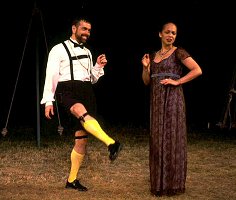
Malvolio comes in, grinning and with his yellow socks.
Olivia says, "Huh? This is a sad occasion." (She's still pretending
to be mourning her brother.) Malvolio tries to joke, saying that the
socks and cross-gartering are making the blood pool in his legs.
But as long as she likes it ("if it please the eye of one"; he's quoting
a love sonnet), it's fine with him. Malvolio continues, and Olivia
thinks he is crazy. She says, "Wilt thou go to bed. Malvolio?" Of course
he answers, "To bed! ay, sweet-heart and I'll come to thee." This usually
gets a big laugh. Maria pretends to be shocked, and Malvolio quotes the letter.
"Be not afraid of greatness. Some are born great, some achieve greatness,
and some have greatness thrust upon them." One of the extras comes in to
announce that Cesario is here, and Malvolio is left alone on stage
to misinterpret what has just happened. Toby, Maria, and Fabian
come in pretending to be solicitous for Malvolio's health. He
is arrogant, and they pretend to think he is sick or possessed.
Fabian says, "If this were played upon a stage now, I could condemn
it is an improbable fiction." Postmodernists who enjoy noting the self-referential
will enjoy this, and it always gets a laugh. Malvolio stalks off
arrogantly, saying they'll soon understand.
The pranksters decide to tie Malvolio up in a dark room.
(This was about all anybody could do for psych emergency
in the pre-phenothiazine era. Decreasing sensory input does seem to help
at least in the short-term, however inhumane long-term confinement once was.)
Andrew comes in with a paper challenging Cesario to a duel.
It's dimwitted.
Fabian's "to exceeding good sense--less" recalls Wayne's "very sensible... not."
Toby advises Andrew to lie in wait for Cesario and to run on him suddenly,
with a loud roar. (Toby knows this will be funnier.) Toby pockets
the challenge, knowing the "boy" is from a good background and a gentleman
and that such a goofy letter will not frighten him. Instead he decides to
relay the challenge by word of mouth.
Olivia comes in with Viola.
Olivia is finishing up a conversation about love to "Cesario",
at once apologizing for what she knows is inappropriate behavior,
and saying that her love is so strong that this insight doesn't phase it.
Viola says Orsino's love is the same as Olivia's. Olivia gives
Viola a jewel which is evidently a cameo of her face, and asks what
else she can give; Viola replies, to love Orsino. Olivia says she can't
honorably do that;
she's given this to "Cesario". She exits. Fabian and Toby deliver
a verbal challenge to Viola from Andrew and represent
that Andrew is "quick, skilful and deadly" as a swordsman. Viola cannot imagine
who would have a quarrel with "him", and that perhaps he's just
testing his valor as some men do with a stranger.
Toby says Andrew most certainly does have reason to be angry;
Viola asks what it is, so that she can apologize for the oversight.
Fabian backs this up, and walks off with the terrified
Viola.
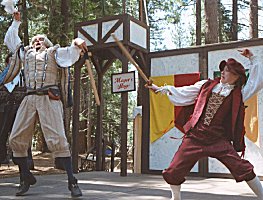
Toby re-enters
with Andrew, in the midst of telling him
what a dangerous opponent "Cesario" is. Toby pretends
already to have lost a swordfight to the boy,
and that "Cesario" had been the special fencer to a
Turkish king. Andrew wants to back out, but Toby says
"Cesario" won't let him. Andrew asks Toby to offer
the boy his horse instead. Fabian and Viola come in.
Toby whispers to Fabian that he has conned Andrew
out of his horse, but this isn't going to work.
The two are brought together, Fabian coaching Viola and
Toby coaching Andrew. As they begin to fight,
Antonio runs in. Antonio has been looking for Sebastian, but don't
ask how he got into Olivia's garden.
Antonio separates the two -- often on
stage this is done by running with his sword between
the duellists and raising it in the air, separating the
swords.
Antonio has mistaken Cesario for Sebastian.
He asks Andrew to put up his sword, and that he will
make good any wrong that "Cesario" has done.
Sir Toby draws his sword (the direction reads "they draw",
but Antonio may already have his sword out), but then the law arrives.
(As usual, Shakespeare is telescoping time.)
Viola puts up her sword and
asks Andrew to put up his sword; Andrew says he will indeed
give him the horse. It turns out the lawmen are after
Antonio rather than the duellists.
Antonio asks Viola for his money. Viola is amazed and offerse
half of what she has, but says
she doesn't know him. Antonio is outraged, and talks about
how "Sebastian" seemed fine on the outside but turned out to be
rotten on the inside. ("In nature there's no blemish but the mind;
None can be called 'deformed' but the unkind.") The officers
think Antonio is crazy and take him away. Viola realizes that this means
Sebastian may be alive. After Viola leaves, the no-goods talk about
what a low character the boy proved to be, abandoning his friend. Andrew
says he'll beat him up; Toby warns him not to draw his sword, and says
aside Andrew still won't dare do anything.
Act IV, scene i happens in the street with the jester
mistaking Sebastian for "Cesario". Some word-play follows
with the jester saying that if he's not Cesario and being
asked for by Olivia, then "nothing that is so is so".
Sebastian tips the jester (as was the custom) and sends him.
Andrew and Toby enter, and also mistaken Sebastian for "Cesario".
Toby grabs Sebastian, and it looks like there's going to be a swordfight.
Then Olivia comes in and breaks it up. Olivia apologizes
for the drunks, and invites "Cesario" in to hear
some funny stories about what idiots Toby and Andrew are.
Sebastian has no clue what's going on, and hesitates.
"Am I crazy? Am I sleeping?" Lethe was the river of forgetfulness.
Sebastian is thrilled with the invitation from a beautiful,
wealthy woman. "If it be thus to dream, still let me sleep!".
He goes off romantically with Olivia.
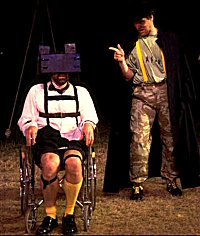 Act IV scene ii takes place somewhere in Olivia's house.
The pranksters are about to torment Malvolio, who has been
confined, either in a dark room or blindfolded.
The jester disguises himself as "Sir Topas the curate".
(Chaucer tells a story of a "Sir Topaz" in his own character, the only
one the hearers didn't enjoy.) The jester jokes that he's not the first
clergyman to fake it. The jester makes fun of a pedantic curate's
learned talk. Make what you will of "That that is, is", in light of
"nothing that is so is so". The jester goes to the steward, who he calls
"Malvolio the lunatic", and addresses him as a pastor might address
the devil within a possessed person. Thus he denies Malvolio's identity,
and then his senses (he insists the house is light), and then
his spirituality (Malvolio "thinks nobly of the soul", but the pastor
will not minister to him until he believes that people reincarnate
as animals.) The jester then uses his own voice and pretends to be
present with the pastor, singing comical songs that touch on
Malvolio's plight. ("How's your ladyfriend? Unkind, maybe? Why?
She likes somebody else?") Malvolio says he's being horribly and wrongfully
treated, that he's as sane as the jester. The jester simply says
that anybody who's no saner than a fool must be crazy indeed.
Finally, the jester asks, "Are you really crazy? Or are you faking?"
("Twelfth Night" was written about the same time as "Hamlet".)
The jester goes out to get the paper and ink that Malvolio has
requested, singing a song. Do you think the prank has gone too far?
Act IV scene ii takes place somewhere in Olivia's house.
The pranksters are about to torment Malvolio, who has been
confined, either in a dark room or blindfolded.
The jester disguises himself as "Sir Topas the curate".
(Chaucer tells a story of a "Sir Topaz" in his own character, the only
one the hearers didn't enjoy.) The jester jokes that he's not the first
clergyman to fake it. The jester makes fun of a pedantic curate's
learned talk. Make what you will of "That that is, is", in light of
"nothing that is so is so". The jester goes to the steward, who he calls
"Malvolio the lunatic", and addresses him as a pastor might address
the devil within a possessed person. Thus he denies Malvolio's identity,
and then his senses (he insists the house is light), and then
his spirituality (Malvolio "thinks nobly of the soul", but the pastor
will not minister to him until he believes that people reincarnate
as animals.) The jester then uses his own voice and pretends to be
present with the pastor, singing comical songs that touch on
Malvolio's plight. ("How's your ladyfriend? Unkind, maybe? Why?
She likes somebody else?") Malvolio says he's being horribly and wrongfully
treated, that he's as sane as the jester. The jester simply says
that anybody who's no saner than a fool must be crazy indeed.
Finally, the jester asks, "Are you really crazy? Or are you faking?"
("Twelfth Night" was written about the same time as "Hamlet".)
The jester goes out to get the paper and ink that Malvolio has
requested, singing a song. Do you think the prank has gone too far?
Act IV scene iii features Sebastian alone on stage. He's wondering
what's real. (This has been a theme recently!)
The events are amazing, but the world seems otherwise as it is.
He can't find Antonio for advice, but he's heard Antonio was looking for him.
Sebastian think perhaps he's crazy -- the lady can't be
crazy since her whole household obeys her and she carries
herself excellently. Olivia comes in with a pastor,
and asks Sebastian for his hand in marriage. This is to be done
secretly, right now, and they'll keep it quiet
until arrangements can be made for a public celebration.
Sebastian agrees. Again, we have the theme of seizing and cherishing
happiness
when it presents itself.
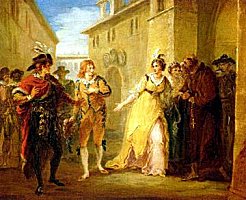 Act V scene i happens in Olivia's front yard. Fabian asks the jester
to show him the latter that Malvolio wrote from confinement. The jester refuses,
probably because the letter isn't funny. Orsino comes
in with Viola and the others,
recognizes and greets the jester, and asks how he is. With his fondness
for paradox, the jester says, "I'm better because of my enemies,
and worse because of my friends." His enemies are honest
in speaking badly of him. "Four negatives make two affirmatives" is a
contemporary joke. In Shakespeare's time, a double-negative was just coming
to be a positive in English; previously it had been a negative.
(Earlier, "I can't not love you" would have meant "I cannot love you
and I will not love you", instead of "I am unable to fall out-of-love with you.")
Orsino tips the jester one coin; the jester asks for two, saying he wants
"double-dealing" (a joke, "double-dealing" means treachery). This gets a
second coin. Some more jokes on the number three don't work.
Act V scene i happens in Olivia's front yard. Fabian asks the jester
to show him the latter that Malvolio wrote from confinement. The jester refuses,
probably because the letter isn't funny. Orsino comes
in with Viola and the others,
recognizes and greets the jester, and asks how he is. With his fondness
for paradox, the jester says, "I'm better because of my enemies,
and worse because of my friends." His enemies are honest
in speaking badly of him. "Four negatives make two affirmatives" is a
contemporary joke. In Shakespeare's time, a double-negative was just coming
to be a positive in English; previously it had been a negative.
(Earlier, "I can't not love you" would have meant "I cannot love you
and I will not love you", instead of "I am unable to fall out-of-love with you.")
Orsino tips the jester one coin; the jester asks for two, saying he wants
"double-dealing" (a joke, "double-dealing" means treachery). This gets a
second coin. Some more jokes on the number three don't work.
Evidently, Orsino is here to find out what happened at the duel.
He knows Antonio has been arrested, and that he matches the description
given by Viola. The police bring Antonio in, obviously at Orsino's request.
Orsino remembers Antonio well. He was an extremely good sea-captain,
admired by the townspeople even while he was raiding.
Viola says he rescued her but then talked very strangely.
Orsino asks Antonio "what foolish boldness" brought him back among
the people who he's made his enemies. Antonio says he was never
a thief or a pirate, but admits being having participated in a raid
that he thought was justified.
But he came to town to help a with a young man
whose life
he's saved from a shipwreck. He points to Viola, and
talks about being bitterly betrayed by "him", who
would not acknowledge even knowing him or return his money. Antonio
says they'd been friends for three months. (As usual, Shakespeare
telescopes time.)
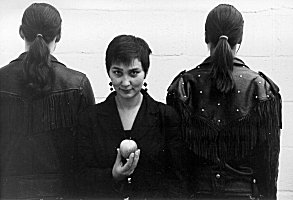
As Olivia is stepping out of her house, Orsino says that Antonio is crazy.
"Cesario" has been with him for the past three months. Orsino speaks
to Olivia. Olivia tells Cesario he's missed an appointment with her.
Orsino speaks pleasantly to her, and she rebuffs him. Like most men
in his situation will eventually do, Orsino turns ugly and starts
abusing Olivia verbally. Olivia brushes him off. Apparently
Orsino finally figures
things out. He says, "Why shouldn't I kill what I love?" -- i.e., kill Cesario,
and leave Olivia forever a "marble-breasted tyrant" incapable of loving.
Amazingly, Viola says she'll let Orsino do anything he wants
if it will make him
feel better. Orsino evidently turns and starts walking away without Viola (i.e.,
he didn't really plan to kill her),
and Viola turns to follow him. Viola says she loves Orsino more
than she'll ever love a wife. Olivia says she's been horribly
deceived. Viola can't understand this. Olivia calls the pastor
to witness that Cesario is her lawfully wedded husband.
Orsino turns back on Cesario, and Viola denies it.
Olivia calls Cesario a coward. The priest comes in and, with pastoral humor,
verifies
the marriage two hours ago.
Orsino calls Cesario a fake, predicts he'll be far
worse by the time he's got his beard, that he'll eventually
ruin his own life, and to stay away from him forever.
Andrew runs in, saying that he and Andrew were just beaten up
by Cesario. The assailant gave Andrew "a bloody cockscomb", i.e.,
the blood matting his hair looks like
a jester's cap. Andrew ends up looking like a fool, literally.
Orsino asks how this could be, and Andrew identifies
Viola as his assailant. Toby and the jester come in;
Toby is very drunk. Andrew offers to help Toby, and Toby rejects it,
calling Andrew "an ass-head and a coxcomb and a knave, a thin-faced
knave, a gull." These are all insulting synonyms for a stupid, gullible man
who's been taken advantage of.
The "friendship" between Toby and the man he's been playing
for a sucker is evidently over.
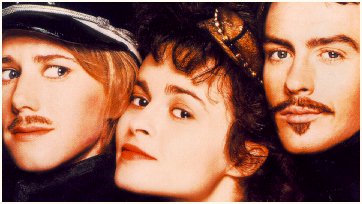
Of course, Sebastian comes in, having been out looking for Antonio,
and apologizing to Olivia for
having beaten up her two relatives who attacked him. He
notices she's looking at him strangely... and asks forgiveness
by their marriage vows. It's now clear what has happened.
The duke sees the identical-looking people and says, "One face,
one voice, one habit, and two persons, a natural perspective,
that is and is not." More paradox, of course. Sebastian embraces
Antonio, who jokes that "an apple, cleft in two, is not more twin
than these two creatures." Sebastian says he never had a brother;
Viola asks Sebastian if he's her brother's spirit. Sebastian says he's a spirit
indeed, like every living person, but in a very-much-alive human body.
Viola reveals her disguise. Orsino realizes that he and Viola love
one another, and asks her to marry him. Viola asks that the captain,
who Malvolio had arrested for some reason, be freed. Olivia calls for Malvolio,
then remembers that he's crazy. The jester brings in Malvolio's letter,
which he reads out loud parodying Malvolio, but the letter (which is a protest
and a resignation) is very sane. During the time it takes to free
Malvolio, Olivia asks Orsino to celebrate a double wedding at her house
and expense. Malvolio comes in, produces
the fake love-letter, and demands an explanation for Olivia's behavior.
Olivia says this is Maria's attempt to imitate her handwriting.
Fabian confesses the prank, and tells that Toby has rewarded Maria
by marrying her. The jester asks Malvolio, "Do you remember
how you told Olivia that I wasn't funny?" Malvolio runs out
saying, "I'll be revenged on the whole pack of you."
Olivia says, "He has been most notoriously abused."
The director needs to decide whether everybody looks
disturbed at the mistreatment, or breaks out laughing together,
or both.
The lovers walk out together, and the jester sings a
largely-nonsense song about how temporary
and uncertain are the joys of life.
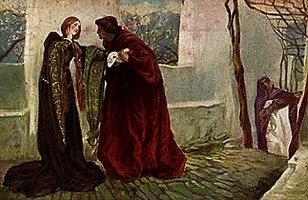
|
"What is Love?"
Feste's song asks the question, and only answers with a negative -- it's not something to save for tomorrow.
Here are some ideas. |
- Viola simply accepts that love is uncontrollable, and falling in love
leads to irony. She know no human being can sort out the tangled webs of love
(II ii). She says that women can and do love more genuinely than men do.
Yet at the end, when the enraged Orsino says he'll kill her,
she is ready to risk life itself because she loves him.
- Orsino says that love is an appetite that he wishes he could overload (with the music
that ordinarily stimulates it), so as to be rid of it.
He adds that being in love with Olivia makes the world seem like a much
less bad place ("clears the air of pestilence"). He describes
love as loss of control. And Orsino says that when you find yourself in love, the ordinary world seems terribly, well, ordinary
(I i). The pains of love are themselves sweet, and anybody who is in love
is unstable in everything except in hold the image of the beloved
constantly before his eyes (II iv). Yet he knows that men are inconstant in their loving.
Although he's the one character who talks
most about the power of love and the constancy of his focus on Olivia, Orsino
realizes at the end that he'll be quite happy with Viola.
(Life's taught me that romantic love is the strongest, most uncontrollable, most satisfying,
and most transient of human emotions.)
- Olivia says she cannot control her own behavior after she's met
Cesario (I v), and that if it's predestined
for her to fall in love, she has to accept it no matter how afraid
she is. Even though love is likely to lead to disaster,
it's best to love as grandly as you can (III i -- better to be eaten by a lion
than by a wolf). When she is planning to court Cesario,
Olivia reflects that she's at once extremely happy and extremely sad,
and hence insane.
- Andrew, who seems to have nothing to like about him except for his money,
remembers, "I was adored once too."
- Malvolio is sick because he
loves only himself. He romances Olivia for his ego and because he wants her
wealth and power.
What do you think causes people to be like this?
Find some more. This might be a good paper topic. At the end, ask yourself
this. Especially in the later scenes, we hear paradoxes about things both
existing and not existing. And at the end, it's hard not to ask one of the
great questions of life: Is love itself an illusion?
In Elizabethan times, men who liked each other as friends evidently
liked to talk about it.
Here in the U.S., there's still plenty of buddy-warmth, but most men
communicate it entirely non-verbally, and this seems to work fine too.
The ancient Greeks considered same-sex friendship to be
more precious than
romantic love. And the Elizabethans even
used to debate which was nobler (as in "The Two Gentlemen of Verona").
Antonio says to Sebastian, "I do adore thee so", and Orsino tells
everybody at the end that he
"loves" Cesario even though the duke still thinks Cesario is a "he".
You already know that Shakespeare
wrote most of his sonnets to a male buddy.
They're intensely personal and a great read.
Sonnet 20, which is very gentle and kind,
appears to be Shakespeare's setting
a limit on the physical side of a cherished friendship.
The two guys
ended up dating the same "dark lady".
Viola functions well as a make-believe male,
and Sebastian is first shown weeping and is "adored" by a male chum.
You won't figure out what all this means, especially
if you're on whatever side of today's "culture war".
But you might be able to write about this, depending on the climate at your own school.
Idea Clusters
These always make good papers.
Music nourishes love, but love in turn makes ordinary music lose
its sweetness (I i). Viola will use several kinds of music as her way of
speaking to the duke (I ii). An very-old sad song is better, to soothe the mood of a
troubled lover, than a modern, fast-paced one (II iv; styles in music
change very rapidly, both then and now.) Viola says the music Orsino chose
echoes the heartbeat itself. Olivia would rather hear Cesario talk than hear
the music of the spheres, i.e., the song the planets supposedly made (III i).
For Olivia, being courted by Orsino after marrying the man she loves (mistakenly) is like
hearing a dog howl after hearing music (V i).
Luck.
It's by luck ("perchance") that Viola survived the wreck.
It is luck ("fortune") that Olivia is so beautiful and fine (II iv);
Orsino knows it but still can't get her out of his mind.
Malvolio says, "'Tis but fortune, all is fortune [i.e., luck]", just
before, by his own bad luck, he finds the letter.
Sebastian tells Antonio that often people are ungrateful, and
that Antonio deserves better luck.
Since so much depends on luck in this world, try to be
happy now, because "what's to come is still unsure."
Virtue. Malvolio may be (or think he is)
the most conventionally
virtuous person in the play, but Sir Toby will still have cakes and ale.
The jester points out that virtue
and sin both are patched with their opposites (I v). No one has a monopoly of either.
Today, members of the Religious
Right ask themselves, "Are we good because we abstain from the
things that ordinary folks do, or because we do good to others?"
Folly: Too many to count. In "As You Like It", we hear a song:
"Most friendship is feigning, most loving mere folly." Puck
sees the lovers and says, "What fools these mortals be!"
You can catalogue the uses of the words
"folly", "foolish", and so forth, in "Twelfth Night", and/or
ask yourself, "Is it folly to love? To refuse to love?"
Disguise: Nothing in the play is as it seems.
The jester pretends to "live by the church" and then to be a pastor,
and even pretends darkness is light.
Two men using the title of knights are good-for-nothings.
An untrained woman and a coward are both
called ferocious duellists. Malvolio is tricked by the pranksters,
and Andrew is tricked perhaps more cruelly by Toby.
Think about
Malvolio's acting as a disguise (he's trying to manipulate Olivia),
and even the jester's costume is a deception -- he's not foolish.
("My brain isn't wearing this costume.")
Time. Look through the play. "O time, thou must untangle this, not I."
At the end, the jester says that in the whirligig
of time, revenge comes. (Our expression is, "What goes around,
comes around.")
Mistaken Identity: I think all works of literature have to do with
"Who am I?" Olivia and the drunks mistake Sebastian for Viola/Cesario.
Everybody thinks Cesario is a man. Malviolio thinks the jester
is the preacher. The pranksters pretend to think that Malvolio is insane.
On a deeper level, Andrew thinks Toby is his friend, and Malvolio thinks
Olivia is his girlfriend. On a still deeper level, Viola tells Olivia,
"You do not know who you yourself are." Maybe at the deepest level, Malvolio
thinks he is a devout Christian, even a Puritan. Is he right or wrong?
Finishing Up
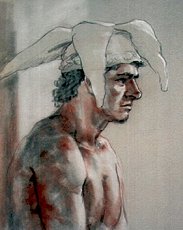 Shakespeare's genius flourished in an era of exploration, of rapidly
developing technology, and a new focus on the possibilities for human life.
I think Shakespeare would have been pleased with what eventually came of the
new humanistic thought. As Shakespeare was writing his last plays,
a new nation was founded in the new world. Many of the original
settlers were Puritans or similar religious dissenters.
Although the Massachusetts Bay colony was not noted for religious tolerance,
the early European-Americans continued the Puritan emphasis on individual
liberty and conscience over government dictate.
Free enterprise and free thought flourished in the colonies.
Eventually, America's founding fathers declared their freedom,
saying that all human
beings have a God-given right to seek happiness.
Shakespeare's genius flourished in an era of exploration, of rapidly
developing technology, and a new focus on the possibilities for human life.
I think Shakespeare would have been pleased with what eventually came of the
new humanistic thought. As Shakespeare was writing his last plays,
a new nation was founded in the new world. Many of the original
settlers were Puritans or similar religious dissenters.
Although the Massachusetts Bay colony was not noted for religious tolerance,
the early European-Americans continued the Puritan emphasis on individual
liberty and conscience over government dictate.
Free enterprise and free thought flourished in the colonies.
Eventually, America's founding fathers declared their freedom,
saying that all human
beings have a God-given right to seek happiness.
"Twelfth Night" is not about politics, but about private life.
And the principal theme is that the pursuit of happiness is not just a right,
but a responsibility. In both the plot and the sub-plot,
we see what happens when someone tries to say "No" to joy and laughter.
It leads not to dignity or tranquility, but to loss of self-control
and very likely to disaster.
If you have enjoyed "Twelfth Night" and/or this page, then think about
whether Shakespeare is right. Do we have a DUTY to
try to be happy? Draw on your own life experience.
Have you known anyone who threw his or her life away doing things that
brought no joy?
In doing things that brought intense momentary pleasure
at the price of career, family, and other relationships?
In focusing forever on personal or ancestral grievances?
Do you know people who have given up all the ordinary joys of life
to stay in
dysfunctional relationships or anti-everything cults?
What problems do people like this cause for those around them?
My hope for you is that you will seek and find happiness in decent living
and in the genuine service
of others. Health and friendship.
To include this page in a bibliography, you may use this format:
Friedlander ER (2003) Enjoying "Twelfth Night" by William Shakespeare Retrieved Dec. 25, 2003 from http://www.pathguy.com/12n.htm
For Modern Language Association sticklers, the name of the site itself
is "The Pathology Guy" and the Sponsoring Institution or Organization
is Ed Friedlander MD.
 |
"Twelfth Night" makes oblique reference to suicide.
Whatever you decide about Shakespeare,
suicide is almost certainly a bad idea.
Among young people who made serious attempts and
failed, 99% said a year later that they are glad they failed. |
Videos:
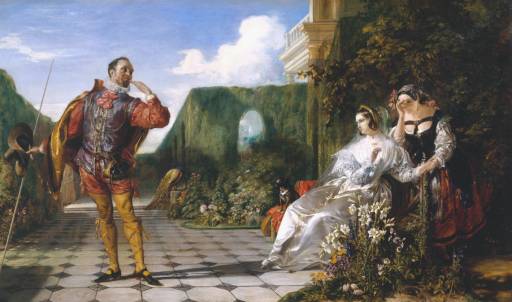 |
Productions Online
|
More about Jesters
Elizabethan insults
Robert Armin, clown-turned-actor, was probably the first Feste
Feste and Olivia illustration by W. Heath Robinson (1872-1944)
Hop Frog by Poe.
"[The King's] fool, or professional jester, was not only a fool,
however. His value was trebled in the eyes of the king,
by the fact of his being also a dwarf and a cripple."
Tabors -- illustrated
|  |
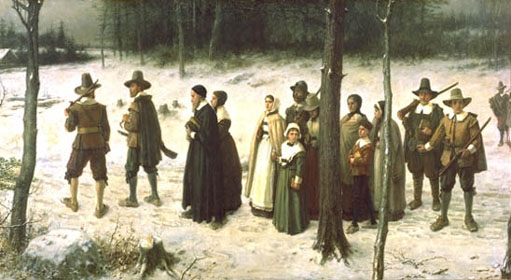 |
More by Ed |
For teachers/students
twelfth-night.info, by my cyberfriend, Philip Weller
NYU -- online student projects
Sources
Sources
Spark Notes -- quotations from Twelfth Night
No Fear -- text along with 21st-century English translation
Inessential Shakespeare -- shortened and simplified in modern English by my cyberfriends, John and Lille Hort
Don't even THINK of plagiarizing "Gradesaver" or any other site for your own essay.
It's wrong. Plus, if your teacher is computer-savvy, he/she will catch you,
you have done grave harm to your future, and people will call this your "tragic
flaw". Ha, ha.
Plagtracker.com -- a new, free plagiary-catcher service
Teach With Movies.
What do you make of
this site's thesis that gender really doesn't matter
in relationships?
Annie's Twelfth Night Page -- Christian
Twelfth Night -- what others have said
Twelfth Night -- Pink Monkey.
Don't miss this site.
Steven Marx -- Postmodernist. Sorry, I can't make sense of this stuff.
 Words and phrases by Shakespeare -- under development Words and phrases by Shakespeare -- under development
Teachers: Click here
to begin your search for online essays intended for would-be plagiarists.
"Dishonesty was your tragic flaw, kid!" Good luck.
Shakespeare Playing Cards
|
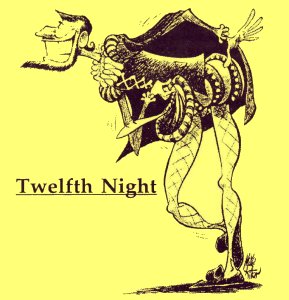
|
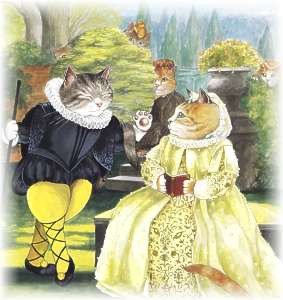
From "Shakespeare Cats" by Susan Herbert |
Miscellaneous
Praise of Folly, by Erasmus. In this life,
no one escapes being foolish some of the time. Erasmus makes fun of a very serious
subject, the politics of unreason. Text here.
Cross-gartering, i.e.,
wrapping suspenders around each other in opposite directions, to hold the shoes in
place and/or provide extra warmth, attested
as an early-medieval men's style. Later, it's for decoration.
Rembrandt
Bear-Baiting
still happens in Pakistan. You can see why Olivia was angry with Fabian.
Pirates Information.
Illyria is really in the Balkans,
named for a Dorian, non-Slavic tribe.
"Illyria" became an archaic name for Croatia, with its shore across the gulf of Venice /
Adriatic sea
from Italy.
Of course, this is not really a play about the real Illyria.
|
|
I've received several requests for my thoughts on Othello,
and wish I had time to put something together. For now, if you're asked to
write on the play, here are two ideas.
(1) Look at the short story which provided
the plot
(click here.
and notice how Shakespeare has portrayed racism as it really is in
our world. Ordinary decent folks (i.e., the Venetian government) care only
who a person is and what that person can do. They consider Brabantio
a jerk for accepting a person of another race as a friend but not as a son-in-law.
Iago, who for whatever reason
has a chip on his shoulder, spews racial venom for his own dark reasons.
Desdemona is originally frightened by someone who looks different, but
quickly learns to love that person so that race become indifferent.
(2) It is very common for special-forces operatives who return to
civilian life and/or who try to sustain a marriage to have terrible
difficulties. Those who are
successful deserve our special admiration. Too many become
terribly confused and end up in self-destructive behaviors,
both loving and hating. It's one of our world's
strangest ironies that romantic love is more treacherous and incomprehensible
than war.
|

|
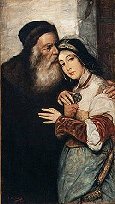 |
Likewise, it'll be a while before I can put anything online about "The
Merchant of Venice." I do want to take a minute to ask people
considering Shakespeare's presentation of Shylock to consider his era.
In all but Shakespeare's earliest plays, our sympathies are always
divided.
Shakespeare's English
contemporaries would seldom or never see a real Jew (they had been expelled
from England in 1280), and
the "stage Jew" of the time was an evil, comic figure.
Nevertheless, Shakespeare is the first writer to present a Jew as a human
being. And it is easy to understand
why Shylock is bitter and angry. Even at the beginning,
the protagonists of the play talk trash
to him simply because he is a Jew, obviously without even thinking.
It's impossible not to notice this. They invite Shylock to
their party simply so that his daughter can rob him,
and afterwards they are only amused when his feelings are trampled.
The play is actually about anger --
and Shakespeare has chosen a Jew to represent somebody who is right
to be angry,
and he allows Shylock to speak about this eloquently, even brilliantly.
This is more than a progressive choice -- it must have taken
a great deal of courage on Shakespeare's part.
Defending himself, Shylock points out the evils of slavery, which
the Jews did not practice but which was accepted at the time by some
Christians. (It was illegal in Shakespeare's England but would soon
re-emerge in the colonies.)
The most famous speech ("The quality of mercy...")
anticipates what I've found to be Shakespeare's greatest theme, i.e.,
in a godless universe, our only hope is to be kind to one another.
No matter what your grievance is, why not be the first to
take the brave step to end the stupid hatreds that darken our world?
|
|
Shakespeare's "Romeo and Juliet" may have been spoiled for you as required reading in high
school, and/or by parodies of the balcony scene and/or a bad (left-wing, right-wing) college
"Western Civ" course. Think: The play's about godawful teenaged murder-suicide. (Juliet is 14,
Romeo 16.) Shakespeare's
plot-source
was a warning to teenagers to obey their parents. The
themes of the play, which were pretty-much new with Shakespeare and very radical in his time, are
(1) young people ought to be allowed to marry for love, not just whoever their parents choose for
them; (2) young people's tragedies likely result from their parents' stupidity and meanness; (3) love
matures people, and gives dignity, meaning, and beauty even in the worst of circumstances. By
the way, did you notice that Papa Capulet is an old guy ("past [his] dancing days",
thirty years since he was "in a mask"), but Mama Capulet
was pregnant with Juliet at age 13. In other words, she was the old
lecher's forced child-bride and she is setting up the same thing for Juliet.
Forced marriage is still common (and the typical cause for a young girl's suicide)
in much of our world. Did you notice that the Capulets are not terribly
surprised to find Juliet dead on her wedding day?
The fact that forced marriage is illegal in the United States and England
may be due, at least in part, to the fact that we listened
when Shakespeare showed us who we are.
| 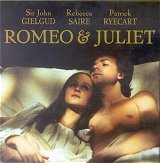 |
E-mail me No texting or chat messages, please. Ordinary e-mails are welcome.

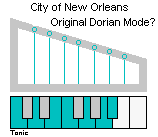 I'm Ed.
You can visit me at my own page
and
follow the links from there to my autopsy page, my
notes on disease (the
largest one-man online medical show, helping individuals
around the world), my Adventure
Gaming sites, or any of the other sites.
I'm Ed.
You can visit me at my own page
and
follow the links from there to my autopsy page, my
notes on disease (the
largest one-man online medical show, helping individuals
around the world), my Adventure
Gaming sites, or any of the other sites. You can E-mail me
at scalpel_blade@yahoo.com.
No texting or chat messages, please. Ordinary e-mails are welcome.
Brown University,
Department of English -- my home base, 1969-1973.
Fellow English majors -- Okay, okay, I know the commas are "supposed" to go inside the
quotation marks and parentheses. This became standard to protect fragile bits of movable type. My practice lets me know I'm the one who's
typed a particular document.
|
|
New visitors to www.pathguy.com
reset Jan. 30, 2005: |


"What is there about Shakespeare that would interest a contemporary
American?"
Visitors send me this question from time to time.
If being a "contemporary American" means being focused on
dirty TV sitcoms, greed, casual sex, big-money sports,
shout-and-pout grievance-group
politics, televangelism, professional wrestling, crybabies, slot machines,
postmodernism,
political action committees,
and "war on drugs" profiteering...
then the answer is probably
"Nothing."
If a contemporary American can still ask, "Is love
the answer to life's inevitable sadness?"
-- then the answer is maybe that
"Shakespeare deals with basic human issues."
 |
Taser Video
83.4 MB
7:26 min |
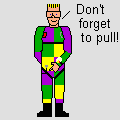 | |
Click here to
see the author prove you can have fun skydiving without being world-class.
Click here to see the author's friend, Dr. Ken Savage,
do it right.
|


|












 Act II scene iii begins with Toby and Andrew, drunk, very late at night.
Toby tells Andrew that going to
bed after midnight is going to be early. When the jester comes in,
he sees they are drunk, and instead of saying anything clever,
he simply talks nonsense, which they find amusing. They ask for a song,
and the jester sings a touching carpe diem song about
welcoming love when you can, given the briefness of youth and
the uncertainty of the future. On the stage, the contrast between
the drunken stupidity and the touching love song makes us listen to the
message, which states the theme. Toby breaks the mood by saying the jester
has bad breath, and they begin singing a drunkards' round. ("Hold thy peace,
thou knave", known from the Lant manuscript of the era,
must be for when one drinker has said something
deemed inappropriate; we have a song like this at the
Act II scene iii begins with Toby and Andrew, drunk, very late at night.
Toby tells Andrew that going to
bed after midnight is going to be early. When the jester comes in,
he sees they are drunk, and instead of saying anything clever,
he simply talks nonsense, which they find amusing. They ask for a song,
and the jester sings a touching carpe diem song about
welcoming love when you can, given the briefness of youth and
the uncertainty of the future. On the stage, the contrast between
the drunken stupidity and the touching love song makes us listen to the
message, which states the theme. Toby breaks the mood by saying the jester
has bad breath, and they begin singing a drunkards' round. ("Hold thy peace,
thou knave", known from the Lant manuscript of the era,
must be for when one drinker has said something
deemed inappropriate; we have a song like this at the 
 Malvolio comes in. We hear his thoughts, as they come, in broken sequence.
We hear him thinking about his romantic opportunities.
(When he says, "Maria once told me that she did affect me", it's not clear
to me whether Malvolio thinks he is liked by Olivia or by Maria.
Of course, Maria despises him.)
He thinks his chances for romance
might be good. But then he thinks about how good his luck
might turn. Perhaps he could be a count himself. All that need happen
is that he marry Olivia. Whoever the lady of the Strachy is,
it's a historical fact that the founder of the Tudor line was
a queen's wardrobe valet. Malvolio is most concerned with being obeyed,
then with being wealthy, then to being able to sleep during the day,
and that with Olivia.
Especially, Toby looks forward to
confronting Toby's alcoholism as head of the family, and getting
rid of Andrew. No, Malvolio isn't in love with Olivia. But he's a careerist
who wants to run a good, orderly house.
Malvolio comes in. We hear his thoughts, as they come, in broken sequence.
We hear him thinking about his romantic opportunities.
(When he says, "Maria once told me that she did affect me", it's not clear
to me whether Malvolio thinks he is liked by Olivia or by Maria.
Of course, Maria despises him.)
He thinks his chances for romance
might be good. But then he thinks about how good his luck
might turn. Perhaps he could be a count himself. All that need happen
is that he marry Olivia. Whoever the lady of the Strachy is,
it's a historical fact that the founder of the Tudor line was
a queen's wardrobe valet. Malvolio is most concerned with being obeyed,
then with being wealthy, then to being able to sleep during the day,
and that with Olivia.
Especially, Toby looks forward to
confronting Toby's alcoholism as head of the family, and getting
rid of Andrew. No, Malvolio isn't in love with Olivia. But he's a careerist
who wants to run a good, orderly house.







 Shakespeare's genius flourished in an era of exploration, of rapidly
developing technology, and a new focus on the possibilities for human life.
I think Shakespeare would have been pleased with what eventually came of the
new humanistic thought. As Shakespeare was writing his last plays,
a new nation was founded in the new world. Many of the original
settlers were Puritans or similar religious dissenters.
Although the Massachusetts Bay colony was not noted for religious tolerance,
the early European-Americans continued the Puritan emphasis on individual
liberty and conscience over government dictate.
Free enterprise and free thought flourished in the colonies.
Eventually, America's founding fathers declared their freedom,
saying that all human
beings have a God-given right to seek happiness.
Shakespeare's genius flourished in an era of exploration, of rapidly
developing technology, and a new focus on the possibilities for human life.
I think Shakespeare would have been pleased with what eventually came of the
new humanistic thought. As Shakespeare was writing his last plays,
a new nation was founded in the new world. Many of the original
settlers were Puritans or similar religious dissenters.
Although the Massachusetts Bay colony was not noted for religious tolerance,
the early European-Americans continued the Puritan emphasis on individual
liberty and conscience over government dictate.
Free enterprise and free thought flourished in the colonies.
Eventually, America's founding fathers declared their freedom,
saying that all human
beings have a God-given right to seek happiness. 



 Words and phrases by Shakespeare
Words and phrases by Shakespeare









